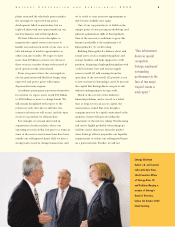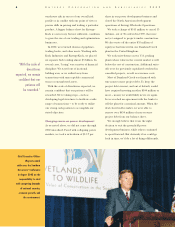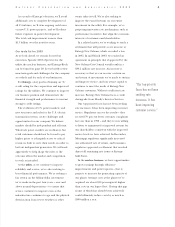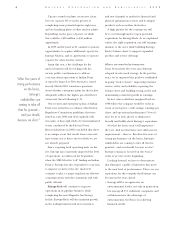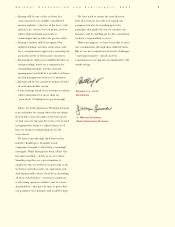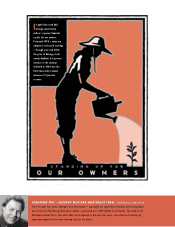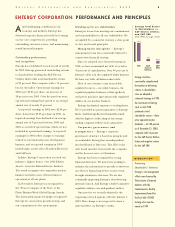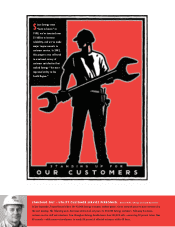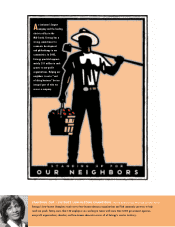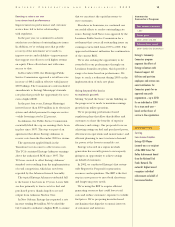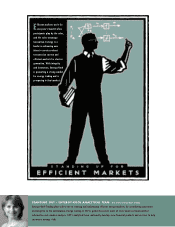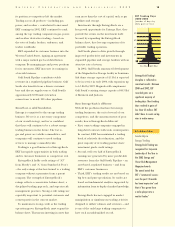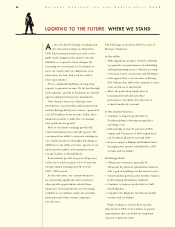Entergy 2002 Annual Report Download - page 15
Download and view the complete annual report
Please find page 15 of the 2002 Entergy annual report below. You can navigate through the pages in the report by either clicking on the pages listed below, or by using the keyword search tool below to find specific information within the annual report.
ENTERGY CORPORATION AND SUBSIDIARIES 2002 13
Earning a return on our
investment and performance
Improvements in performance and customer
service have led to better relationships
with regulators.
In the past year, we continued to achieve
satisfactory resolution of outstanding rate issues.
In addition, we’re seeking rates that provide
recovery of the investment we’ve made to
improve service and reliability – improvements
that support our efforts to seek higher returns
on equity. These efforts have met with some
success to date.
In December 2002, the Mississippi Public
Service Commission approved a retail base rate
increase of $48.2 million effective with January
2003 billings. The Commission's order included
amendments to Entergy Mississippi’s formula
rate plan that provide the opportunity for us to
earn a higher ROE.
In the past four years, Entergy Mississippi
invested more than $350 million in its electricity
system and added personnel to improve service
– while lowering rates by 22 percent.
In Arkansas, the Public Service Commission
essentially lifted the cap on earnings that’s been
in place since 1997. The step was part of an
agreement that allows Entergy Arkansas to
recover costs from the December 2000 ice storms.
The agreement applied funds in the
Transition Cost Account to offset storm costs.
The TCA contained Entergy Arkansas earnings
above the authorized ROE since 1997. The
TCA was created to offset Entergy Arkansas’
stranded costs resulting from the implementation
of retail competition, which has now been
repealed by the Arkansas General Assembly.
The typical Entergy Arkansas residential bill
is the lowest it has been in 17 years. Lower bills
are due primarily to lower costs for fuel and
purchased power, thanks largely to record
output from Arkansas Nuclear One.
In New Orleans, Entergy has requested a rate
increase totaling $44 million. We’ve asked the
City Council to authorize a higher ROE, to ensure
that we can attract the capital necessary to
serve customers.
Elsewhere in Louisiana, we continued our
successful efforts to resolve outstanding rate
issues. Entergy Gulf States won approval by the
Louisiana Public Service Commission for a
settlement that covers all outstanding issues on
earnings reviews filed from 1997 to 2001. The
approved settlement authorizes the continuation
of the current ROE.
We’re also seeking the opportunity to be
rewarded for our performance through our
Louisiana formula rate plans, which provide a
range of returns based on performance. We
hope to reach a settlement during 2003 on the
implementation of such rate plans.
Going beyond the basics
to maintain growth
Moving “beyond the basics” means building on
the progress we’ve made to maintain earnings
growth from utility operations.
We’re proposing performance-based
regulation plans that allow shareholders and
customers to share the benefits of superior
efficiency and savings. Our proposals focus on
achieving savings on fuel and purchased power,
efficiencies in operations and maintenance, and
efficient planning to meet customer demand
for power at the lowest reasonable cost.
Entergy is located in a region in which
generation has recently grown to overcapacity,
giving us an opportunity to achieve savings
on behalf of customers.
In 2002, we conducted Entergy’s first system-
wide Request for Proposal for generation
resources and acquisitions. The RFP is the first
step in a new process to meet both short-term
and long-term power needs.
We’re using the RFP to acquire efficient
generating resources that could lower total
costs and reduce customers’ exposure to volatile
fuel prices. We’re proposing incentive-based
mechanisms that align the economic interests
of customers and investors.
Entergy’s Community
Connectors program
augments the efforts of
Entergy volunteers with
financial support. All
full-time and part-time
employees and retirees can
earn Contributions for
Connectors grants for an
approved non-profit
organization – up to $250
for an individual or $500
for a team each year –
based on their hours of
service to the organization.
RECOGNITION
Serving
Low-Income Families
Entergy CEO Wayne
Leonard was a co-recipient
of the 2002 Sister Pat
Kelley Achievement Award
from the National Fuel
Funds Network. The
network’s highest award
recognizes individual
achievement on behalf of
low-income families.
Total number of members
1,507
Grants given
2000 – 2002: $36,850
Volunteer hours served
2000 – 2002: Over 23,000 hours
Community
Connectors Program


